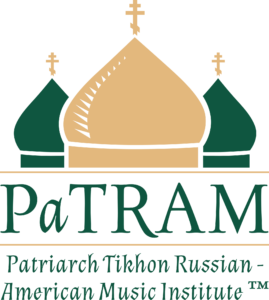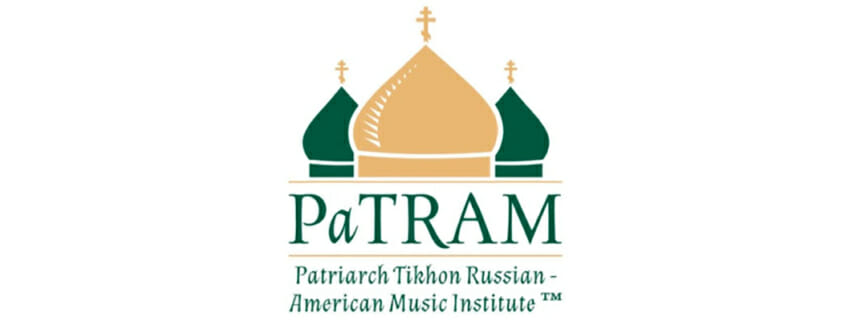Renowned Conductor, Steven Fox, Reviews PaTRAM Institute™ CD,”Blessed Art Thou among Women”
“Throughout the recording, the choir of thirty singers performs not only with an excellent blend, but also with a varied palette of vocal colors that reflect the mood and style of each individual piece….the singing is passionate, not just outwardly, but coming from a deep place of spirituality. This is an aspect of PaTRAM’s mission that shines through.” Coming from such an accomplished choral conductor, Maestro Steven Fox’s review of PaTRAM Institute’s latest CD is, indeed, high praise.

Steven Fox* is himself an accomplished recording artist having successfully led the Clarion Choir to multiple Grammy nominations, conducted the Clarion Orchestra in performing live operas and other classical works and was appointed, as Music Director, to The Cathedral Choral Society in Washington, DC. PaTRAM Institute is honored to have Mr. Fox review our recording, below:
This is the fourth recording from the PaTRAM Institute in their impressive series of Russian Orthodox sacred works. The album brings together Marian works from the Baroque period through the 20th century (with one 21st-century work) in honor of Protopresbyter Valery Lukianov, the father of PaTRAM founder Alexis Lukianov, who passed away in 2018. Fr. Valery, as explained in a letter in the booklet, was especially devoted to the Mother of God. Therefore PaTRAM’s program for this recording is a very fitting tribute to his memory.
The program of works was compiled by conductor Peter Jermihov, one of the foremost authorities in the research and performance of Russian Orthodox sacred music. He was assisted in the programming by Kathy Lukianov, co-founder of PaTRAM and an accomplished choral conductor in her own right.
Throughout the recording, the choir of thirty singers performs not only with an excellent blend, but also with a varied palette of vocal colors that reflect the mood and style of each individual piece. Mr. Jermihov brings technical prowess and interpretive conviction. Thankfully, the curated program plays out not in chronological order, but in a way in which different settings of the same text can be heard side by side. This allows listeners to appreciate the subtle differences in the ways each composer approached these texts.
The recording is made in the Cathedral of St. Alexander Nevsky in Howell, New Jersey, and the program begins with a flourish of the Cathedral bells: a traditional call to worship with a unique melody composed by Peter Lukianov. We are then thrust into two settings of the text ‘Deva Dnes,’ a Christmas text announcing the Birth of Christ. PaTRAM’s performance of Dmitri Bortniansky’s setting brings out the quintessential rhythmic elements of his high Classical style. Jermihov also stretches the tempo in certain places to draw attention to moments in the text that deserve special appreciation, such as ‘rodisya’ (‘is born’). Alexander Kastalsky’s setting of the same prayer follows Bortniansky’s and is also performed with great rhythmic vitality. The Kastalsky has a slightly richer harmonic palette, and some unexpected harmonic turns, as one often finds in his works. For example, there is a quick resolution to unison at the end of the phrase: ‘The Angels, with the shepherds, glorify Him.’ Kastalsky has a knack for achieving high drama in short forms – even many of his larger works are divided into shorter movements, pithy in meaning and musical material. Later in the disc we hear another Kastalsky work, ‘Rejoice, O Queen,’ also beautifully rendered by the choir, and drawing attention to the composer’s signature skill of weaving a chant melody effortlessly through the different parts of the choir.
Vasily Polikarpovich Titov’s ‘O Virgin Unwedded’ is a prime example of Russian Baroque choral music (yes, there is such a thing!). Titov’s music is in the Russian polychoral tradition of Diletsky, but it also has significant similarities to Venitian antiphonal music of the early Baroque. The juxtaposition of music that recalls a Gabrieli polychoral work with the dark colors of the Church Slavonic language is strikingly beautiful.
Mr. Jermihov brings his particular expertise in the music of Soviet composer Sviridov to light in the performance of the ‘Hymn of Praise’. Jermihov is a champion of Sviridov’s works, and the performance makes a compelling argument for his being one of the most important composers of sacred music from Soviet Russia. The slow moving, rich harmonic progressions place the listener in the world of the magnificent Cathedral and its ethereal acoustics.
Pavel Chesnokov was one of the first composers of Russian sacred music to have his works embraced in the West, where editions of his music were printed both in Church Slavonic and in English. Chesnokov’s music speaks powerfully, emotionally, and directly. This could be why it has always been appreciated outside of Russia and across the globe. ‘Most Holy Theotokos, Save Us’ is fascinating in its antiphonal writing between the choir and the Deacon. The Deacon’s part is sung by Protodeacon Leonid Roschko, whose voice has a ravishing dark color and a disarming humanity.
The text ‘Do Not Lament Me, O Mother’ is captured in a modern setting by Sergey Zheludkov, whose style is reminiscent of the late 19th-century Russian composers of sacred music. The performance features a gorgeous solo by renowned basso profundo Glenn Miller. Later on the disc, we hear Alexander Chesnokov’s setting of the same text, starting more starkly but growing in intensity through to the final line of text: ‘I shall exalt all who magnify Thee in faith and love.’
In the first part of the recording, the singing is admirably controlled. But for Rachmaninoff’s The Theotokos, Ever-Vigilant in Prayer, the singing opens up in a different and welcome way, particularly in the phrase: ‘grob i umershchvleniye ne uderzhasta’ / ‘neither the tomb nor death could hold captive’. This kind of thrilling, free singing could have perhaps been welcome on a few more moments on the disc!
There is something arrestingly beautiful and stoic about the performance of Kallinikov’s concise Ave Maria, compared with the slightly more harmonically rich and dramatic setting of the same text by Tcherepnin (the very next track on the recording). Both versions, with their contrasting styles, are executed with great elegance by the PaTRAM choir. Also beautifully rendered are the two contrasting settings of ‘It is Truly Meet’: the first a bell-like, joyous setting by Gretchaninov; the second, a more introspective setting by Tcherepnin. The melodic motives in Tcherepnin’s setting are hauntingly doubled sometimes in octaves, other times in 11ths. The PaTRAM choir executes these parallel lines well in tune (not easy to do!). Both of these settings are extraordinary, and, according to the notes in the disc, are recorded here for the very first time.
Nikolai Mikhailovich Danilin was the legendary director of the Moscow Synodal Choir when they premiered Rachmaninoff’s All-Night Vigil. His setting of St. John of Damascus hymn ‘All of Creation Rejoices in Thee’ has a wondrous sense of awe and reverence throughout – a wonderful discovery for me on this recording.
Ledkovsky’s freely-composed ‘The Angel Cried Out’ is also a stand-out composition on the disc, performed with great presence and warmth – one has the sense that the choir members have known this piece for a long time. It also includes a soaring solo by the wonderful soprano Fotina Naumenko.
Works on the recording by Ilyashenko, Matvyeyev, Lvovsky, and Tolstiakov show the remarkable ability of these composers to write liturgically-appropriate pieces that also have a very high level of musical sophistication. Matveyev’s Magnification for the Icon ‘Joy of All the Sorrowful’ reflects the ‘opulence from a bygone era,’ as Mr. Jermihov writes in the booklet notes. And the singing he elicits from the choir is full and opulent indeed, and the excellent solo quartet adds additional dynamism to the choral texture.
The recording ends on a very personal note, with a male quartet singing ‘In the Flesh Thou Didst Fall Asleep,’ a hymn which Fr. Valery Lukianov used to sing himself during Easter services, and then with ‘Memory Eternal’ by Pavel Chesnokov, intoned, in a moving gesture, by Fr. Valery’s son, Alexis Lukianov.
Throughout the recording, the singing is passionate, not just outwardly, but coming from a deep place of spirituality. This is an aspect of PaTRAM’s mission that shines through. Maestro Jermihov’s own wisdom and experience in the Russian Orthodox liturgy imbue the performances with an earnest passion and communication of the meaning of the text. Jermihov also brings to the performances a sense of how these works function liturgically. This is something that these composers, many of whom were active in the church themselves, thought about. Therefore, these considerations are often part of the essential fabric of the music. The recording is produced superbly by Blanton Alspaugh, John Newton, and their Soundmirror team: the sound in the space is captured in such a way that you can hear the details and characterful qualities in the voices, but also appreciate the experience one would have sitting in the middle of the Cathedral, where the voices crystallize. It is moving to note that the Cathedral of St. Alexander Nevsky was engineered and built by Fr. Valery Lukianov. It was the ideal setting for this recording and one of the reasons it turned out so well.
*The reviewer, Steven Fox, has collaborated with the PaTRAM Institute and Mr. Jermihov on several occasions.


